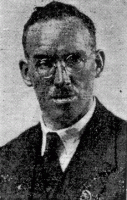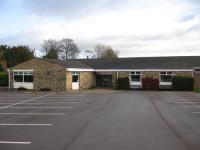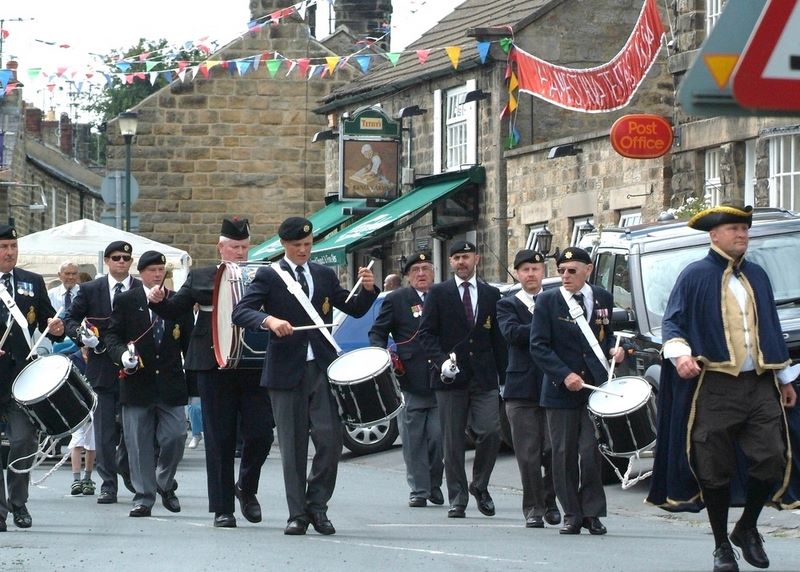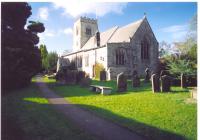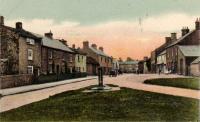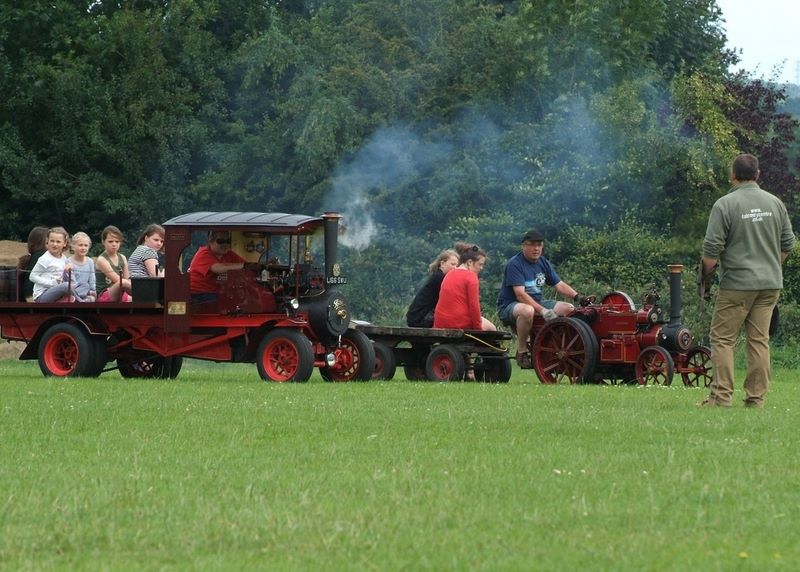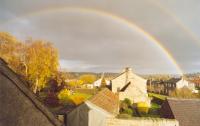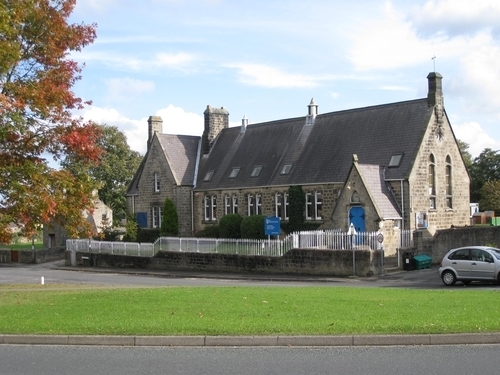Recent articles
© DT Online 2010 - 2026
| World War 1 Diary - 1915An account of the 5th Yorks. (1st line) visit to the Continent. April 17th.1915 This diary was originally written in a pocket note-book which also contained notes from military lectures and sundry jottings of the sort that any infantry corporal might be expected to make. On the first page are the following details: Northumbrian Division T. F.
Cpl 2049 Percy T Hough 1/5 Yorkshire Regiment No 16 Platoon, D Coy In the event of this book being found please return to the above or to the following address: Mr Charles Hough 9 Lockwood Road Goldthorpe Nr Rotherham Yorkshire
P. T. Hough was my father, he was often known as PTH, and he died as the Schoolmaster of Hampsthwaite - a small village in the Dales near Harrogate. At the outbreak of war on 4 August 1914, he was a miner at Hickleton Main Colliery and was attending Sheffield University School of Mines in the evenings, working for qualifications and his manager's ticket. Like many from his village (Goldthorpe) he was on holiday in Scarborough on 4th August '14 and promptly went to the TA unit which was doing its training in the old camp there. He and others were enlisted at once and sent home to dispose of their personal effects and finalise their domestic arrangements. Henceforth they were "Green Howards". After the period described in this diary, father was commissioned into the Royal Engineers who were searching for officers and men with tunnelling or mining experience. Elsewhere I have written of his work as a Tunneller : here it is sufficient to say that it took him under much of No Mans Land and through the Tunnellers' set piece of the Messines Ridge. As a Tunneller he was *twice mentioned in Dispatches and was awarded a Military Cross. Perhaps it was this work that laid down the foundation of his rheumatic fever in 1932 and finally the heart trouble that killed him at the age of forty-four in 1937. References in the diary to M.E.W. are to Margaret Elizabeth Wressell. She was the daughter of a retired police sergeant who was then licensee of the "Coach and Horses" in Barnburgh, a village near to Goldthorpe. PTH and MEW married in 1920 and I was their only child. MEH, as she now was, died in 1985 at the age of nine two. They are buried in Hampsthwaite. I have edited this diary as little as possible but I have had to alter one or two abbreviations which are no longer in use. I have also suggested alternative spellings for some place-names and have added notes where something has seemed to be particularly obscure. The reader will find grammatical oddities, doubtless the reader will also reflect on whether. In similar circumstances , he would have managed to write anything at all. Old Somerby, Feb.88 Richard H Hough *I suspect RHH was wrong on this point. I have an idea that the first MID was for events described in the following pages (whilst still in the Infantry) PSQH. Somewhere in France 21 April 1915 An account of the 5th Yorks. (1st line) visit to the Continent. April 17th.1915 After being recalled by telegram from our farewell leave on April 10th we commenced a week of tedious work outfitting the men. In our D Coy I was Orderly Sergeant for the week. We were in the Rye Hill (Peoples Hall) billet and I found my hands about as full as I could manage. Every day one fellow or another would find he was short of something or other in his equipment when we had just completed the list of that particular article. The chief event of the week was a Zeppelin alarm about 9.15 pm on Wednesday night. We had to douse lights, get men into basement with rifles and equipment ready. At 10.15 the order was cancelled from the Divisional office. Next morning, according to the papers, the Zeppelin had been at Blyth, Wallsend, Cramlington, Killingworth and various other villages. About a score of bombs had been dropped with a result of one damaged cottage. Orders came out on Thursday 15th April that the battalion would move in two trains. A & B Coys and certain officers and details in the first and C & D and the rest In the second. However although all was ready we did not move until Saturday. The first train left about 11.00 am and ours about 11.30 am. We had a great send off by the Newcastle people. Our 2nd line Battn. lined the road to the station and the band of the T.S.(NF) played us in the station and on the platform. The men rode eight in a carriage but in ours there were Sgt Foster, Cpls Davison, Townsend, Edmond and self. We left Newcastle at last and stopped ten minutes at York. Then on to Doncaster by the Great Northern line. Outside Doncaster we stopped to change engines shipping a GN. After a three minutes stop in Doncaster we ran through on to the Great Eastern end stopped five minutes at Spalding where tea at 1½d per cup and scones could be obtained. We had a five minutes stop at March and got better tea at 1d per cup. From there we passed through Ely, Cambridge and Bishop's Stortford and arrived in London at 8.10 pm at Liverpool St. station. During the journey through the suburbs we noticed a large number of searchlights on the go from different points of the city. We stayed at this station twenty minutes and then made direct to Folkestone. From the train we marched straight on to the South Eastern Company's ship "Onward" and left Folkestone at 11.20 pm. Men were instructed in use of life jackets and given orders for the trip. No lights, no smoking, no noise. These done, lights were put out and we passed very quickly over to Boulogne. On the way over we could see our Torpedo escorts just showing dimly away on either side. Sunday 18 Apl 1915 We landed in Boulogne Harbour about 2.00 am. and were marched up through the town a distance of about three miles to a Rest Camp. It was a very cold night but as the road was mostly uphill we were soon hot enough. On reaching the camp we were dumped eighteen in a patrol tent, large size, but a tight fit. Each man was given a blanket with a neck hole in the centre and we had to get down to it as best we could on the floor. About 5.30am. I turned out and found a lot of fellows stirring. The camp was a very large place on the top of a hill in the midst of some very English looking scenery. A wash and a change of socks put things on a much better footing for comfort and we were issued with a dixie per tent of very vile tea. About 7.00 am iron rations consisting of small biscuits, tea, sugar, and Oxo, and a tin of bully were issued with instructions not to be touched until orders. About 8.00am. we had breakfast of bread jam and bully and biscuits and tea. During the morning and afternoon we were given two days grub to take with us. In the morning I got down to the YMCA Tent in the Camp and had some cocoa. I also tried my hand at French with some of the kids on the roadside and found it quite passable. We were only allowed to send Field Post Cards but I got two letters posted in the town by some of the native lads. We were advised to get all sleep possible in the afternoon as we moved at night. All blankets were returned at 9.00pm. and at 12.00pm. we fell in and were off at 12.30am. (During the evening I got in a short service at the Y.M.C.A.) Monday 19th April '15 From the camp we went down a steep rough road for about three miles to Pont-a-Brique station where we had to wait an hour or more whilst different trains of transport horses etc. went through. Our train came in at length and we were packed in vans forty to fifty in each so that each man could just squat on his pack. We left the station about: 3.30 am. and after a bumpy ride detrained at Cassel station about 8.30am where we found our transport awaiting us. We marched through the town to the drums and passed the 4th Yorks. and 4th E.Yorks. resting and feeding in a field. The morning was very warm and the road uphill most of the way. We passed one or two lots of French soldiers and guards and were struck by the number of estaminets or inns along the road. We pulled up for a halt after going five or six miles and had to about turn as we were found to be a mile or more out of our way on the wrong road. Already several fellows had fallen out and one or two collapsed and this check took a lot of heart out of them all. As the heat increased more fellows fell out and we had to have frequent halts until at last Steenvoorde was reached. Here we formed up and with the band made a fairly decent show through the town where there was a lot of Motor-Transport and soldiers stationed. About a mile and a half further on we turned off to our left from the main road and at last landed at a farm and we (D Coy) were told to fallout. I was sent with Mr Clark to interview the people at another farm nearby (Mons. Zepelin) and to see the accommodation he had offered for forty men. He was out and at first had some trouble in making myself understood and understanding owing to the Flemish accent. We even had to resort to writing for a while. We asked for a drink and were given cafe-au-lait. It was nectar after the long pull. On returning I found No. 14 and No.16 platoons settled nicely in the top or a huge barn with several feet of straw to lie on. Our CSM warned me for guard at 8.00pm. so after a wash I bought a glass or biere, a slab of bread and two boiled eggs and I turned in about 3.30pm. Woke up at 7.00pm and had tea. Mounted guard - two hours on and four off - with three men just outside the barn door. I was able to make a kip and about 9.00pm. We had a dixie of good tea with biscuits and cheese. About 10.00pm. the lady of the house fetched me to the stable where Capt. Barber's horse and one of theirs were. The former she said. was a "cheval mechant" and had kicked her horse. We accordingly got her's out and fastened it in the yard for the night. Outside we could hear the sound of distant firing and see the flashes of the guns.Tuesday 20th April 1915. Dismissed guard at 8am. There was nothing during the morning but a rifle inspection so that we had time to look about a bit. I got into conversation with a lad on the farm who told me that he spoke both Flemish and French. He said the former was the easiest. The name of the farmer he said was Henri Vanderlinden. As no bounds had been stated, Smart and I went for a walk in the afternoon about a mile. We passed "A" Coy's billet: and went over the frontier into Belgium, A few yards over there is a small estaminet and general store where one can buy chocolate, English caramels, and almost everything down to rubber shoes. The lady who kept the shop wanted to beg my Imperial Service and put a lot of persuasion for it until I said "C'est pour ma fille en Angleterre" and then smiles. By the way souvenir hunting is a very strong feature of the natives out here and one has to watch one's buttons etc. In the evening bounds were made out and one or two chaps run in for going beyond them. Wednesday 21/4/15 Set off on route march and, on reaching parade ground, Coys were sent back as there were sixty-six absentees. In consequence, everyone – officers’ servants, guards old and new and all employed men had to turn out. We went through the little Belgian frontier village of Herberg(?), straight through to Wotan (?Watou?) and turned to the right to Abeele(?l'Abeele?).This place was full of soldiers and transport of one kind or another. We found the cobbles on the Steenvoorde road from Abeele very trying and we were all tired when we got back to the billet. During the evening Langley, Edmund and I went to "B" Coy's billet to see Rob and Coy and saw a German Taube nearby. It was soon shelled and had to clear. Thursday 22nd April 1915 Had inspection of rifles, iron rations and feet. Had to discard all superfluous clothing from our packs. Today we actually had potatoes for dinner and found the bully much nicer with it. The tinned butter we have had issued here is fine and much better than what we got at Newcastle. Had a letter from M.E.W. (Note. This refers to Margaret Elizabeth Wressel: they married in1920) Friday 23rd April 1915 Had to pack up directly after breakfast ready to move. Each man had to carry his own blankets and it was surprising how many spare blankets there were when this order came out. Marched to Steenvoorde main road and rest in a field on the roadside. While there saw a lot of the Yorkshire Hussars pass, also a fleet or motor buses. After a while we had to march out and get into another lot of buses, twenty five in each. In these we were bumped along through Abeele and Poperinge which is quite a large throng town with a fine church. From Poperinge we went on to the outskirts of Flemington (?Vlamertinge?) where we unloaded and piled arms in a field. After an hours wait, during which one or two Canadians gave us some harrowing tales of the trenches, we marched on to a camp near Ypres. Instead of tents, the camp consisted of huts to sleep about twenty five each and shaped like a patrol tent. In the hut we were packed in we round a tin of jam and a lot of broken biscuits so that we could help out the meagre tea we were served with. The shell fire here sounded very close and we could see large powerful green fire balls being sent up. Lights out was at 8.30pm. and L Cpl J. Parker slept next to me. We had orders to put our packs so that they were carried by the supporting straps and not by the braces to enable them to be easily thrown off. Just before going to sleep Parker said he did not expect coming through. 24 April 1915 In the early hours I heard the 4th E. Yorks. in the next line turning out and then we had orders to get out and fall in at once in Platoons. We then had to load ten rounds into our magazines and close the safety catches. We were marched off through the camp and, during one of the many stoppages, we got into conversation with several Canadians and other troops who were returning. They all spoke of the murderous effect of the shell fire and the poisonous gases: indeed even then many seemed partly drunk with them. We were marched to a position on the banks of the Yser Canal which was held by French Algerian soldiers. Their trenches were on the top of the bank while we dug in along the bottom of the bank. Many of our chaps lit small fires to make tea but in a very short time we had several "Jack Johnsons" over and very close. The fires were hastily put out and we got down to it. North(?) of my section got hit in the neck. Tich Hiting of B. Young Hare (?) and another were all hit there. Our batteries soon replied. The Algerians were very well off for grub; being supplied with beans (hot), tinned meats, sardines, bread, wine and any amount of tobacco. We had practically nothing and had it not been for them giving stuff away it would have been hard lines for us. About 2pm we had to march away along the banks across the river through what had apparently been the gardens of a large house where Kilties and Canadians and all troops were hastily trenching and then on to open ground beyond. Here we advanced in open order in lines or platoons under heavy shell fire. The calls for the stretcher bearers were very frequent. At one place near a road the Major called the Officers up to a cottage to confer with them. Lieut. Brown was downed by a shell which burst close to him but was unhurt. Here we had our first taste of stink shells. The fumes were overpowering and made a mess of' our eyes almost blinding us and causing great pain. On the roadside we passed four fine horses disembowelled by shells and a pig feeding off one. Close by here, L. Cpl Parker was hit in the head and badly injured. A little further on No.16 Platoon ran into a heavy enfilade from several Maxims and, as we ran and took cover by lying flat in the open, the bullets buzzed round like wasps. We all thought our time had come. There was a slight hollow in the ground where we took cover to regain our breath and then after one or two short rushes we reached a ditch alongside a hedge with a bit of dead ground in front. Here we dug ourselves in. At the bottom or the trench were several inches of decayed straw which stank horribly. During the night we kept getting shells over and as it came on to rain we did not enjoy it greatly.25 April 1915 In the early morning we were relieved and moved forward until day was breaking and we were seen by the enemy and shelled. We laid down in an open piece of plough land in the rain for over an hour and then the fire got so hot that we had to move and take cover in the ditch along the roadside which was a foot deep in horrid, putrid, evil-smelling slime. We made our way through the fence and got down in the field. The shells were bursting horribly near and Maxim and rifle bullets whistling round. We lost several men here including Billy Marr and Sergt Joy (the latter killed). At this point; some of the D.L.I. (5th) vacated some trenches owing to the heavy fire. Major Mortimer then shouted out to us "Go on men, there is no retreat. The Yorkshires never go back. Get forward everyone" and himself led us on. Not a man wavered. We dropped into the trench vacated by the D.L.I. and those for whom there was not room made reserve trenches behind us. During the day we were pestered by snipers and shells. It was from this place that Capt. Barker and twenty five of our chaps with twenty five and one or two officers of the D.L.I. made an effort to clear a barn of snipers. As they got to the farm they were met with a crossfire from two machine guns. Through this they charged with bayonets right up to the buildings near which Capt. Barker fell killed with a bullet through the head and five other wounds. Lieut. Brown of the 5th D.L.I. was wounded as well as some of our chaps. The Germans, who were dressed mostly in kilts and khaki, retired from the farm before the charge to their trenches n few hundred yards further back and again trained their machine guns onto our few who had to return. Close by our trench was a ruined cottage with a dead soldier in Algerian uniform. We heard he was a German sniper thus disguised. At a farm a couple of hundred yards on the right, there was water to be obtained and, in going across, Sergt. Whiting (Cook) spotted a sniper laid on the roof. The Canadian officer with him killed him instantly with a fine revolver shot. The afternoon was very hot and as the D.L.I. had left some of their blankets in the trench we got a bit of sleep. We were all feeling very hungry but had no grub having got through our emergency rations of biscuits and bully earlier on. In the evening all grocery rations were collected as an attempt was to be made to make tea in the morning. At night the rations arrived by the transport. They were fine consisting of a bag to every six men containing:
26 April 1915 Early on Monday morning, whilst there was a bit of mist, it was decided to make a fire for tea. The Major and S.M. Radley and one or two others were stood round the pile of grocery rations when a shell burst in the middle and sent the tea and sugar all over the place and covered those near with dust but caused no hurt. So we went without any tea. Sandbags were issued in large numbers to be filled and put in front of our trenches to make a strong parapet. As soon as the mist cleared we were bombarded again by shellfire for an hour or more. These trenches had been previously occupied and in improving them we had turned up a dead French Soldier and part of his clothes still showed at the end of the trench. As the heat increased so did the smell. During the forenoon, we saw a lot of troops advancing in our rear on the right. They came on magnificently under a terrible shellfire, advancing in Diamond formation in extended order. A party of the 7th N.F. coming up on our right got too far over and had to crowd into our trench. They were seen by the enemy who commenced a terrific bombardment keeping it up for over two hours. We were simply packed there being in the part of the trench where I was fifteen men in a six yard length. Lucky for us that we had put up the sandbags as otherwise we should have been wiped out. We got quite a hail of spent shrapnel bullets and pieces of shell. At last some live pieces flew in. One hit the chap next to me (a N.F.) on the muscle of the arm, giving him a very bad bruise, whilst another cut my first and second fingers on the left hand. On this occurring, Capt. Thompson sent word to Major Mortimer who ordered the N.F.s to re-join their Coy on our right. Just round the corner of the traverse at the end of our trench a N.F. sergeant was hit on the breast pocket button with a piece of shell at the same time as us. It cut through a hard backed testament and notebook and through his clothes to the skin without hurting him. On the piece of shell was the print of his button. During the rest of the day the shellfire was kept up in bursts of ten or fifteen minutes at a time by both sides. Towards evening the rumour went around that we had to occupy the advanced trenches. Each man was ordered to take two sandbags with him. The order then came that we were to be relieved and we lined up on the road. We were then ordered back to await the reliefs and finally taken up to the advance trenches. We had done so well in the trenches we were leaving that, by holding them, we had enabled a division to advance nearly four miles on the enemy. The place we held was the pivot on which the whole of the enveloping movement on both our flanks depended. The trenches we went into were about half a mile ahead on the left of the road. They were badly made and, in the part I was in, it was knee deep in water and sticky mud. We had to deepen it and make parapets front and rear. Soon after getting in we were fired upon and immediately rifle fire opened on all sides. For some few minutes the bullets whistled from every corner and we could only keep our heads down and squat in the water. At last things quietened down and it was afterwards ascertained that we had been enfiladed by a German Maxim. It was a terrible time and we really thought that the enemy had broken through and surrounded us. In the next length of trench a dug out was made for us to get into out of the water which had made our feet numb and practically dead to any feeling. Tuesday and Wednesday We were so tired and knocked up that things are a bit hazy as to what occurred separately on each day so I have missed Tuesday out.Wednesday 28th April 1915 There was not much firing during the night until very early morning when we were shelled heavily for about half an hour. We were now so tired that we slept stood to arms through most of this. During the morning we excavated the sides so as to afford more protection. We were much troubled by snipers here. Our officers, Mr ( ? ) Maxwell and Capt. Thompson were spotted and could scarcely stir with shots coming in. In a cottage, some 350 yards in front, were several snipers who, by employing dummies, managed to fool us for some time. The snipers were also in trees lining the road to the left. It was a favourite trick of theirs to have a dummy showing from one tree and to keep firing from another. Capt. Thompson however sent word to the artillery behind us and soon the cottage went west and then tree after tree was smashed up by our guns. Towards evening the fellows ventured out again for water as we were all very dry. About 7 pm. Megginson of B Coy came across and asked if I wanted anything out of Rob's pack. Asking what he meant he said Rob was just about out of time. He had been with Story and Church when a shell burst in the trench. Church had his leg severed and was partially disembowelled, and Rob was smashed up on the head. When taken to the hospital shelter the Doctor said it was hopeless and only a case of a few minutes. He was accordingly put on one side with the dead. I tried to get to see him but could not. At 10.30 we vacated the trenches and were replaced by the 4th Yorks. We marched back through a ruined village past lots of dead horses. The stench all the way along was very strong. Just before reaching Ypres one shell dropped on the road side close to us and killed a horse picketed there. We landed at last in the huts and had tea and grub issued and as the hut room was scarce several of us slept out and had a very good night. Thursday 29th April 1915 Just as we got breakfast we had to scoot to field below and dig funk holes as Brielan (?Brielen?) the village nearby, was being shelled. It was good to get letters and to send some off to relieve the anxiety which they must feel. A wash and shave made a wonderful difference as we had six days growth on. Found that we had made a good name amongst the regulars particularly the Canadians who called us the "Yorkshire Ghurkas". Had a turn at cooking bully stew for dinner. Was able to get cafe at a near farm. After a quiet evening we decided on sleeping out again. Friday 30 April 1915 During morning blankets and groundsheets had to be packed. During evening we had orders to be ready to move at 5pm. This however was missed as the roads were full of troops moving up. About 11pm. the huts were shelled but, as we were all ready to move, it was not a long job to get into the funk holes. About midnight we got back to the huts. Saturday 1st May 1915 In the early morning, about 5am, Sergts Foster, Whiting and self went round the next field where most of the shells burst. The Adjutant of the 4th East Yorks. horse was picketed to a tree. A large shell had burst at the foot of the tree and thrown it bodily about ten yards away. Of the horse all that was left were its head, backbone and hind legs and these were about fifteen yards away. Round the field various other horses were killed and injured. After: tea we moved to somewhere near Flernentine. All the way we kept. as much as possible to the fields and by-lanes. In one place we passed through what, in the dark, seemed like a large park and we went for a long way through a fine avenue. We turned into a field for the night. Sunday 2 May 19l5 Had an early walk and got two eggs at the farm and a bowl of cafe-au-lait. The farm was however put out of bounds shortly after. During day we were able to get chips and other delicacies in the way of cough lozenges from the farm children. During the day we had some rain and soon everyone was busy rigging up shelters with their groundsheets. We moved away in the evening onto the Poperinge-Ypres road and went through Poperlnge, Abeele and nearly to Steenvoorde where, about done up, we turned into a barn on the roadside for the nightMonday 3rd May 1915 A cup of coffee in the morning and some "pain" to help breakfast down put us in better form. We spent the day in the field and made a trip to the shop at the corner where one could buy sweets of several varieties and almost everything else from tobacco to buckets. About 4pm. we moved off to a billet about three miles West of Steenvoorde. Here D Coy were packed like herrings in one farm We landed about 8pm and were served with tea, a bit of cheese and one loaf per platoon. (Note .This would be at least twenty men!). Tuesday 4th May 1915. Had to fall in before breakfast in drill order and were marched to the crossroads where the D.L.I.(5th) were lined up. We were drawn up in review order and the officers lined in front of us. There were several Brigade officers hanging about directing things and presently up came a string of half-dozen fine motors. Members of Headquarters staff including Field Marshall Sir John French. He proceeded to speak to us and thanked us for the great show we had made at St Julien. He complimented the Division and the Brigade and particularly the 5th Yorks. and 5th D.L.I. He enumerated our losses as: 1 officer killed He said that he knew he could rely on us in any other emergency that might arise. On returning to billet we got breakfast at 12.30. In the afternoon had a parcel from M.E.W. with cigars, chocolates, biscuits and stationery in. It was a great treat. At the bottom of the field was a nice clear stream where we were able to get a bath. In the evening Phil Robson, Parker, Read and I went to a shop near by which was kept by some Belgian and French. They made us very welcome and we had a cup of coffee each. They understood English a little and when Read said in an undertone that the coffee would go well with rum they gave us a wineglass each of cognac in it. The charge was 1½d each for cafe and cognac. It was fine. We bought some bread very cheap and were told to go the following day for some more. Wednesday 5th May 1915 Had to act again as Platoon Sergt as Ward is on Provost Duty and Forster Orderly Sergt. Lt Maxwell played smash because I had not a parade onto the minute. Langley was a bandolier short at Ammunition Inspection so I had to put a crime against him. Captain Robson gave him a chance to revert which he did. Platoon on Duty tomorrow on Guard at Battalion Headquarters. Thursday 6th May 1915 Mounted Guard with L. Cpl Crosby and six men at 9.15am. First guard here not to get chalked off at mounting. In forenoon Major Mortimer and Radley were weighing packs and greatcoats and had one of latter cut down. QMS gave us a lot of tea and sugar mixed so that we were able to make some for ourselves. At dinner the Transport gave us ¾ of a dixie of first rate fresh meat stew. We soon put it out of sight as our own rations consisted of a boiled spud, a biscuit and a tin of bully each. Had hair cut Portland style on horse machine. During the night the noises made by the frogs and the sounds of the mules were a bit weird. A nightingale nearby sounded very sweet. Lt Woodcock (Orderly Officer) came about 1am. Friday 7th May 1915 Had early breakfast and cleared up. Relieved at 9.05am and slept most of morning. Attended the NCO's drill parade at 3pm. Hdqrs Detailing handling of arms etc. Cut greatcoats down to 2" above knee. As day was hot slept out all night. Saturday 8th May 1915 NCO's drill parade 1am. and 3pm. As a move was expected all ammunition except 120 rounds (per man?) was withdrawn. Had a parcel from home and letters from Geo Green , Shaw, Home and M.E.W. Move turned out to be a false alarm so stayed the night in the billet. Sunday 9th May 1915 Went to seek Communion Service at 4th Yorks. Hqrs. but found there was nothing known. Had service there at 10.30am. in Drill Order. Packed 25% of blankets for men in trenches. Had order to be ready to move at 12 noon. Eventually got away at 6.15pm to Steenvoorde where, after a wait, we left by buses to the dug outs on the right of the road between Flementine and Poperinge. Slept out sharing blankets and groundsheets. Monday 10th May l9l5 In the event of shell fire, as the trench dug outs would not hold all of us, we had to dig more along the side of the others. Saw several Belgian carts drawn by dogs along the road. An armoured loco went up and down on the line a time or two. Saw an airship brought down - nationality unknown. Tuesday 11th May 1915 Mr Maxwell left us to join the Brigade staff so have to be Acting Platoon Sergt when necessary. Had orders to be ready to move in afternoon. Just got tea when we had to clear. Went up line till we cut into Ypres road and then straight into the town. Left our kit(16 and part of 15) (Note. Does this mean the kit of No 16 platoon and of part of No 15 platoon's?) by the canal side. Ptes W Oldfield, Smart, Ruston, Shuttleworth and I had to stay and saw barbed wire stakes for Engineers whilst the others went driving them in and wiring. Had a walk up to where work was being done. The streets were terrible for ruins and in one place . . . . The diary stops at this point. We do not know why. It was against all the rules for diaries to be kept, except for official Unit War Diaries, so perhaps that is the explanation. Equally it may be that at that point things became hectic and the diary was never resumed. My belief is that they were once again embattled and this time diary keeping was just too much. When PTH became commissioned shortly afterwards his daily engineer reports would have been all the diary he needed. NOTES ON THE DIARY 17 April 1915 1. The T.S.(NF) probably refers to some part of the Northumberland Fusiliers. Probably to a Tyneside TA Battalion. 2. This journey is of interest to railway fans. In 1915 there were over one hundred railway companies in Britain though the Government found that, as the war progressed, it had to exercise some co-ordination. For most of the men this would be the longest journey they had ever done and when they moved onto "foreign" metals at Doncaster they would feel that the "only road for an Englishman" had begun in earnest. The writer believes that the route followed was thus: From NEWCASTLE by the North Eastern Railway route (now tbe East Coast Main Line) via YORK to DONCASTER thence by the Great Northern & Grea t Eastern Joint Railway via LINCOLN, SLEAFORD.SPALDING to MARCH. From MARCH by the Great Eastern via CAMBRIDGE and BISHOPS STORTFORD to LIVERPOOL STREET. (The writer has tedious memories of this route in World War 2). From LIVERPOOL St they would back-track into SHOREDITCH to BISHOPGATE JUNCTION to go onto the East London Joint Rallway.This was a somewhat involved arrangement of the Great Easte-n, London Brighton & South Coast, Mletropolitan, Metropolitan District and the South Eastern & Chatham Railway Companies. The East London Joint took them via SHADWELL, ROTHERHITHE, SURREY DOCKS to NEW CROSS JUNCTION where they joined the SE & CR. They could have gone via MAIDSTONE or CHATHAM thence to FOLKESTONE. Today that journey is impossible. The tunnel under the Thames still exists but much of the infrastructure is missi.ng. On the other hand the Eurotunnel may well introduce the EDINBURGH - PARIS express stopping at NEWCASTLE and LONDON. 3. The "Torpedo escorts" were probably what where then called "Torpedo boat destroyers”. They would have been manned by the Dover Patrol whose arduous task was to keep the sea-lane to France open for the safe transit of troops. 18 April 4. Armies always have difficulty in rationing troops in transit especially when foraging from the land is not acceptable. The writer feels that his wars in Burma and Korea were comfortably fed compared with his father's. 5. Iron rations could only be eaten on the orders of an officer. 19 April 6. Troops going to France in 1939 found that French railway trucks were still marked with the numbers of "hommes" and "cheveaux" they could carry. 7. The problem of keeping men fit, both in terms of general health and in terms of having fit feet for long marches with heavy kit, was always a major problem for the infantry. Only continuous marching was really effective but this was tedious and cut into time needed do other training and for the normal administration of the unit. Also there were times when a choice had to be made between maintaining fitness and wearing out a limited supply of boots. The march described was obviously a bit of a mess and it is not surprising that a training route march occurred a few days later. Route marches had two other uses: they "showed the flag" and they familiarised the men with the locality. 20 April 8. The "Imperial Service" that the lady wanted to acquire was a badge issued to Territorials who went overseas. It was prized because the origins of the TA were in Home Defence. 20 April 9. Jack Johnson was a pugilist with a famous punch, hence the name for a notorious German mortar. 10. PTH spoke well of the fighting qualities of the Algerian troops and also commented on their often macabre sense of humour. 25 April 11. "Thank God for the Guns", The British Army has often had to face enemies using more and longer-ranged guns than ours but the flexibility and control of the Royal Artillery has rarely been equalled in modern history. The writer can recall young officers (not themselves Gunners) calling for support and having the entire Divisional artillery on target in a matter of minutes. 3. May 12. See note 4 above. 4 May 13. It seems a poor sort of honouring that does not include breakfast before noon. Nevertheless one should remember that a new way of war was being learned. Technology had reached the point where orders to move could be issued quickly and troops could fall-in and march away at very short notice. To re-deploy rations was a much slower task. Supply waggons went at a horses pace and were much more road bound than men. Above all units and the Staff were still learning. 14. The battalion lost, permanently or temporarily, 157 all ranks at. St Julian. That was about 13% of its strength in what was, by the standards of that war not such a great battle. 6 May 15. Cynics have noted that in every army the transport section always seems to have some food. Does it fall off their lorries? World War 1 Diary - 1915 An account of the 5th Yorks. (1st line) visit to the Continent. April 17th.1915 This diary was originally written in a pocket note-book which also contained notes from military lectures and sundry jottings of the sort that any infantry corporal might be expected to make. On the first page are the following details: |




